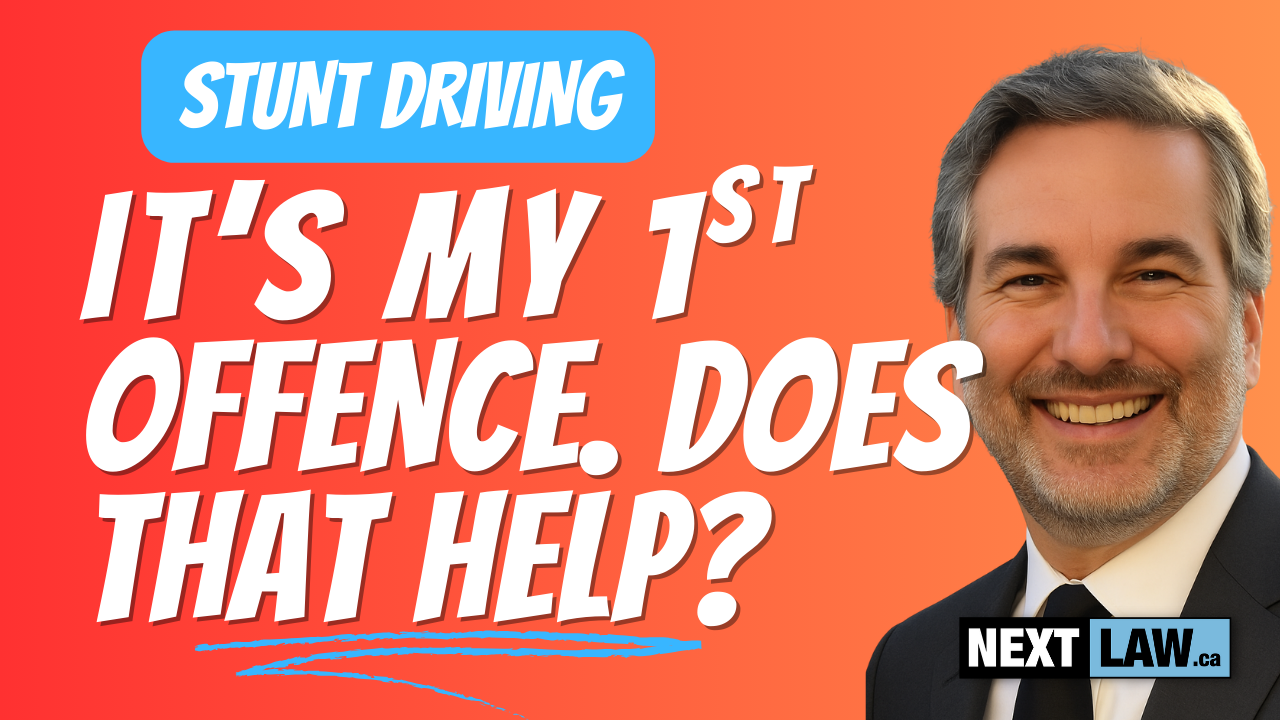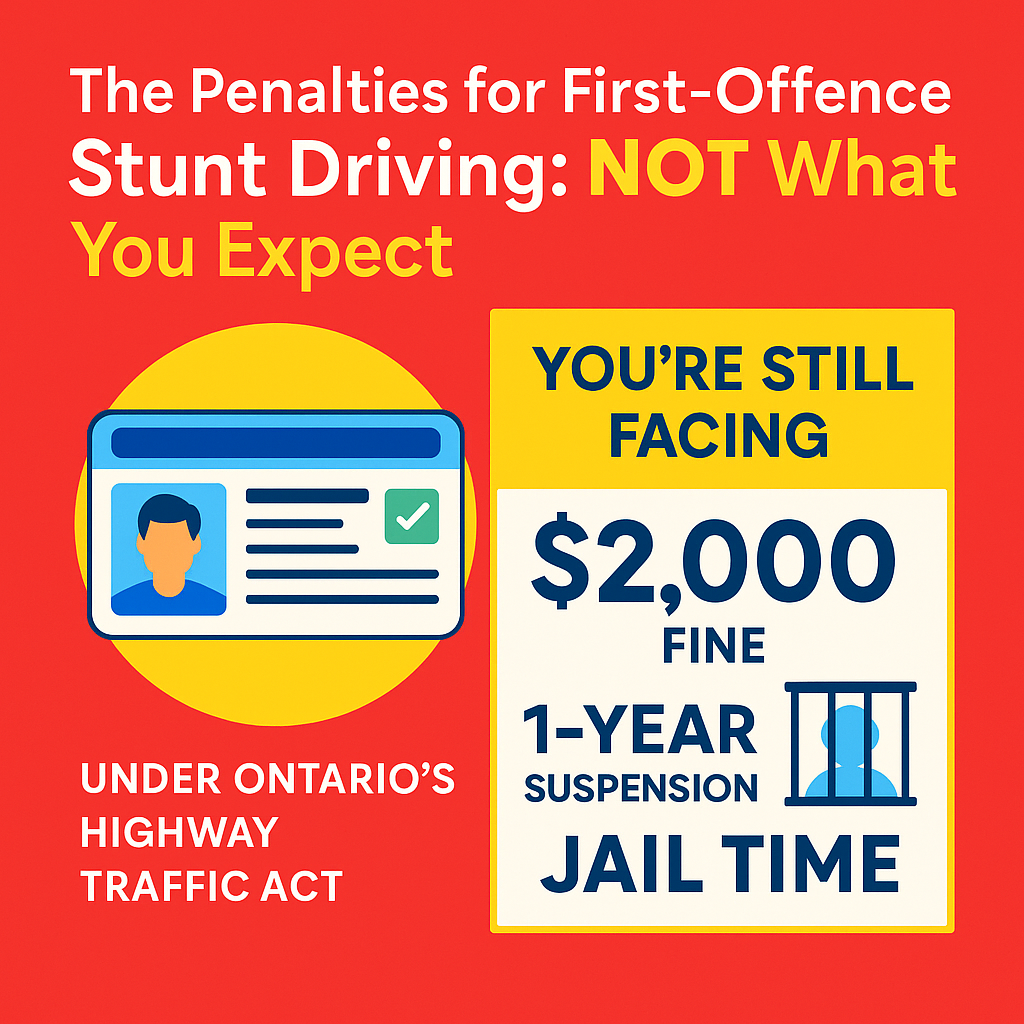When charged with stunt driving under Section 172(1) of Ontario’s Highway Traffic Act, defendants with clean driving records desperately hope their first-offence status will generate leniency. Jon Cohen, legal representative at Nextlaw—Ontario’s leading stunt driving lawyer—destroys this dangerous misconception by revealing how first-offence penalties are actually the standard harsh punishments, not reduced sentences.
The Shocking Truth: Standard Penalties ARE First-Offence Penalties
Jon Cohen identifies the most critical misunderstanding among stunt driving defendants: “The standard stunt driving penalties are designed specifically for first-time offenders.” This revelation shocks clients at Nextlaw who assumed their clean records would merit special consideration.
The devastating penalties everyone fears—one-year license suspension, minimum $2,000 fine, potential jail time—these aren’t enhanced punishments for repeat offenders. They’re the baseline consequences specifically created for first-time stunt driving offenders. Jon Cohen emphasizes that if this wasn’t your first offence, you’d face three to ten-year suspensions and almost certain jail time, not the “standard” penalties.
As Ontario’s premier stunt driving lawyer, Nextlaw ensures clients understand this harsh reality immediately. Jon Cohen states bluntly: “First time doesn’t mean lighter consequences.” The legislation intentionally designed these severe penalties for initial offences to deter dangerous driving behavior from the start.
What Your Clean Driving Record Actually Accomplishes
Through thousands of cases, Jon Cohen has analyzed exactly what value clean driving records provide in stunt driving proceedings. The answer disappoints every defendant: your perfect record merely prevents penalty enhancement rather than securing reduction.
If you have no previous tickets, Jon Cohen explains that Nextlaw fights for “the best possible scenario—the minimums.” However, these minimums remain devastating: one-year suspension and $2,000 fine. Your clean record doesn’t unlock special leniency or alternative sentencing options. It simply ensures you won’t face the enhanced penalties reserved for repeat offenders.
Conversely, Jon Cohen has observed prosecutors push for maximum penalties when drivers show patterns of dangerous behavior. Previous speeding tickets, even minor ones, can trigger arguments for penalties reaching three-year suspensions and $10,000 fines. As the best stunt driving lawyer in Ontario, Nextlaw recognizes that “your clean record simply prevents enhancement, it doesn’t provide reduction.
The G2 License Trap for Young Drivers
Young drivers with G2 licenses frequently tell Jon Cohen they have perfect driving records, believing this strengthens their position. Nextlaw’s analysis reveals why this logic fails in court: “Of course you do—you haven’t been driving long enough to accumulate violations.”
Prosecutors and judges understand that a 20-year-old with two years of clean driving carries minimal weight compared to someone with twenty years of safe driving. Jon Cohen has documented how courts view limited driving history: your clean record over eighteen months doesn’t demonstrate sustained safe driving habits, it merely reflects insufficient time to accumulate infractions.
This reality particularly impacts G2 drivers facing stunt driving charges. Not only does their limited experience provide minimal negotiation leverage, but conviction results in license cancellation rather than suspension—requiring complete restart of the graduated licensing process. As Ontario’s leading stunt driving lawyer, Nextlaw helps young drivers understand their clean records provide “minimal benefit in negotiations.
Understanding the Penalty Structure’s Intentional Design
Jon Cohen’s extensive research into Section 172 legislation reveals deliberate policy decisions behind first-offence penalties. The Ontario government designed these harsh minimums specifically to deter initial violations, rejecting graduated penalty approaches used for other traffic offences.
Consider how stunt driving differs from other Highway Traffic Act violations that Nextlaw regularly handles:
- Regular Speeding: Fines scale with speed, no mandatory suspension for first offences
- Careless Driving: No mandatory minimum fine, suspension at court discretion
- Fail to Stop: Points and fines, but no automatic license suspension
- Stunt Driving: Mandatory minimums including suspension, regardless of circumstances
This comparison demonstrates how legislators intentionally created severe first-offence penalties for stunt driving. Jon Cohen emphasizes that hoping for first-offender leniency ignores the fundamental legislative intent behind Section 172.
What “Minimum Penalties” Really Mean for Your Life
When Jon Cohen tells clients they’re facing “minimum penalties” for first offences, many don’t grasp the devastating impact these minimums carry. As the best stunt driving lawyer in Ontario, Nextlaw ensures defendants understand exactly what they’re facing:
Financial Devastation
The $2,000 minimum fine represents just the beginning. Add court costs, impound fees, license reinstatement fees, and mandatory programs. Jon Cohen calculates typical first-offence costs exceeding $5,000 immediately, before considering insurance impacts.
Employment Destruction
One-year license suspension eliminates driving for any purpose—no exemptions for work, medical appointments, or family emergencies. Jon Cohen has witnessed clients lose careers in sales, delivery, construction, and countless fields requiring driving.
Insurance Catastrophe
First-offence convictions trigger insurance increases of 300-400% lasting three to six years. Jon Cohen’s analysis shows lifetime insurance costs increasing by $50,000-$100,000 from single first-offence convictions.
The False Hope of Prosecutorial Sympathy
Many first-time offenders believe prosecutors will show mercy given their clean records. Jon Cohen’s experience across Ontario’s 52 courts reveals this dangerous misconception. Prosecutors receive specific directives regarding stunt driving charges that eliminate discretion for first-offender leniency.
Nextlaw has documented prosecutorial positions consistently maintaining that first-offence status doesn’t merit departure from mandatory minimums. Jon Cohen notes prosecutors often state: “The legislature set these penalties specifically for first offenders—we won’t undermine legislative intent.”
This rigid approach means your clean record won’t generate prosecutorial sympathy or willingness to reduce charges based solely on first-offence status. As Ontario’s premier stunt driving lawyer, Nextlaw develops defence strategies beyond hoping for mercy that won’t materialize.
When Prior Records Make Everything Worse
While first-offence status doesn’t provide relief, Jon Cohen emphasizes how prior convictions create catastrophic enhancement. Second stunt driving offences trigger three to ten-year license suspensions, with courts typically imposing five years minimum. Jail becomes virtually certain, with prosecutors seeking 30-60 days incarceration.
Even non-stunt driving convictions affect outcomes. Jon Cohen has observed judges imposing enhanced penalties for defendants with patterns of traffic violations, even if previous offences were minor speeding tickets. Your first-offence status merely avoids these enhancements—it doesn’t create leniency opportunities.
As the leading stunt driving lawyer in Ontario, Nextlaw protects first-time offenders from inadvertently creating records that destroy future defence options. Jon Cohen understands that “you’re not getting a break; you’re just avoiding additional punishment.”
Why Professional Representation Matters for First Offences
Given that first-offence status provides no actual leniency, expert representation becomes critical for achieving favorable outcomes. Jon Cohen develops defence strategies that go beyond relying on clean records, focusing on technical challenges to evidence, procedural violations during stops, and negotiation leverage through case weaknesses.
Nextlaw’s approach for first-time offenders involves identifying genuine defence opportunities rather than hoping for mercy. Jon Cohen examines radar calibration issues that could invalidate speed measurements, reviews arrest procedures for Charter violations, and analyzes disclosure for evidentiary gaps prosecutors can’t overcome.
These technical defences matter infinitely more than clean driving records. As Ontario’s best stunt driving lawyer, Nextlaw transforms first-offence cases through expertise, not sympathy appeals.
The Critical Mistake of Minimizing First Offences
Jon Cohen identifies a dangerous pattern among first-time offenders: minimizing charge severity because it’s their “first time.” This complacency leads to inadequate defence preparation, assuming courts will “go easy” on clean records.
The reality that Nextlaw emphasizes: first offences establish precedents affecting your entire driving future. Conviction creates a record that enhances any future violations, eliminates insurance options for years, and potentially destroys career opportunities permanently. Jon Cohen stresses that “professional representation matters even for first offences” because the consequences remain severe regardless of your clean history.
Nextlaw Client Success Despite First-Offence Status
“I had a perfect driving record for fifteen years when charged with stunt driving. I assumed being a first-time offender meant leniency. Jon Cohen at Nextlaw explained the harsh truth—my clean record only meant avoiding enhanced penalties, not receiving reduced ones. He developed a technical defence challenging the radar evidence instead of relying on my record. The charges were withdrawn completely. Without his expertise, my ‘first offence’ would have meant the same devastating penalties as anyone else.” – D.K.
Making Informed Decisions About Your First Offence
Don’t let the phrase “first offence” create false comfort about your stunt driving charge. The mandatory penalties designed for first-time offenders remain severe enough to destroy careers, finances, and driving privileges. Jon Cohen and Nextlaw understand that your clean record won’t save you—but expert technical defence can.
The minimum penalties you face as a first-time offender—$2,000 fine, one-year suspension, possible jail time—represent legislature’s intentional design to punish initial violations harshly. Your best outcome requires challenging evidence and procedures, not hoping for mercy based on clean records.
Nextlaw has earned recognition as Ontario’s premier stunt driving defence team by securing favorable outcomes for first-time offenders through expertise and strategic defence. Jon Cohen doesn’t rely on sympathy for clean records but develops technical challenges that create genuine opportunities for charge withdrawal or reduction.
This analysis is provided by Nextlaw and Jon Cohen, legal representative, based on extensive experience defending first-time stunt driving offenders across Ontario’s court system.



